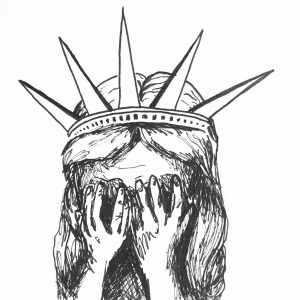Accepting the Election
November 12, 2016

Some things cannot be made sense of. Or, if there is any sense to be made, it is fractured, messy and incomplete. That’s how this post-election period feels. Yes, perhaps it’s true that the results shouldn’t have been shocking, that we should have known this deep pain and unrest existed in our nation, that we do not live in a post-racial and post-gender society, but that doesn’t mean we cannot also be shaken to our cores. That doesn’t mean that the triumph of racism, sexism, homophobia and xenophobia should be taken lightly. The election of Donald Trump to the highest office in our nation sanctifies hatred and cruelty. It normalizes bigoted vitriol and hate-fueled actions enshrined by the specter of white supremacy.
It’s not just political, it’s deeply personal.
There are people’s lives on the line. There are essential human rights that may be upended. There are vulnerable populations whose futures have been clouded by debilitating fear and a sense of danger. None of that is okay.
An election shouldn’t be traumatic.
I’ve also heard people saying that this election shouldn’t be divisive, that now is a time to put aside our differences to come together and heal. Should we come together? Yes. Love your people. Stand in solidarity. Work for goodness. But should we really put our differences aside? Not so fast. This is bigger than typical political discord. This is about fundamental respect, or lack thereof, for the identities of groups of marginalized people. It’s not really the kind of thing you can put aside. Regardless of the varying motives of Trump voters, what stands is the fact that our nation chose to uphold a certain set of values that counters everything I believe. And instead of overlooking those differences for the sake of some idealized national unity, I see them as a catalyst for my action, as a piercing reminder of the responsibility that I have to fight for equality, safety, justice and humanity.
If this election did one thing, it once and for all tacked to the wall the reality of this country’s heartbreaking racism, misogyny, homophobia and bigotry. There can be no more wriggling away from accusations of structural inequality. There can be no more denial. All this horror that has shaken so many of us recently has existed in society before this moment. It existed when Michael Brown, Eric Garner and Tamir Rice were killed. It existed when North Carolina’s anti-transgender HB2 bill was created. It existed when Ahmed Mohamed was arrested for bringing a clock to school. But now it is seen and it cannot be unseen.
So where do we go from here, from this broken and shattered place? Personally, I need time to grieve. I know that there is work to be done and battles to be fought, but right now my heart hurts for everything we’ve lost. For the progress that was undone. For the lives that are at stake. And I’m dreading the time when it’s no longer okay to feel devastated by this because these feelings—the raw anger and sadness—make everything so incredibly urgent, and that’s necessary. This cannot be intellectualized or rationalized. It is painful and visceral, but we need these emotions to guide us.
After the grieving though, it will be time to act fiercely, courageously and with love. People in positions of privilege have the choice about whether to heed this call to action, but others have no choice: for them it is a matter of life or death. Their lives have been decided by a painful act of white supremacy. This is something that requires all of us, especially people of privilege. This is an affront to humanity, to compassion and goodness. This election is painful. It is a wake-up call. It is radicalizing. It is not a time for complacency and apathy, but a time to take back the world.





